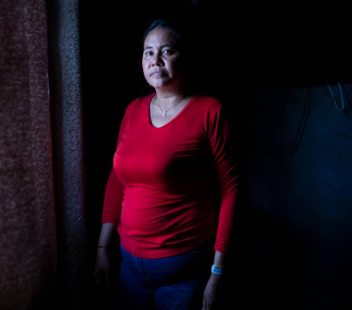“No one pays you to be a leader, you do it for vocation. But being a leader allows you to save lives, save water sources, save the flowers and plants so we are content because we look around and see all we have saved.”
- Yuli Velázquez

Introduction
Water defender Yuli Velásquez is fighting for the protection of clean water to ensure a future for the animals, the plants, and her community, in Colombia, that also means fighting for her own life. In 2022, Colombia was once again reported to be the most dangerous country in the world for environmental defenders for the subsequent year in a row with 60 leaders being murdered. Even globally 30% of all attacks against human rights defenders are related to extractivist sectors such as oil and mining. Yuli and the courageous women defenders continue their dedication to the environment despite all odds.
Formed by the Water
Yuli Velásquez grew up on the Magdalena River in the northwestern department of Santander, Colombia in one of the many communities whose lives are intertwined with the wetlands of San Silvestre. Yuli’s city of Barrancabermeja is a dangerous nexus between armed actors, extractivist companies and community members like her parents protecting the animals and water from pollution. Yuli was taught the responsibility of caring for the earth from her mother Yasmin, a prominent social leader and her stepfather a leader and fisherman murdered by paramilitaries for his work promoting the protection of the environment over profit. Despite the consistent struggle Yuli has seen an increase of pollutants in the water, dead manatees on the shores, and violence on the river banks.
Sinister Threats to the Environment
Yuli points to companies such as Ecopetrol, the largest gas company in Colombia, who have turned her region of Magdalena Medio into a landscape of oil extraction. As the health of the river communities weaken the suspected bonds between Ecopetrol and paramilitary groups are growing stronger. Now as the Director of the Federation of Artisanal, Environmental and Tourist Fishermen of Santander (Fedepesán) the organization leads on the protection of water sources in different plant and animal species as well as providing environmental education. Their responsibilities take them far into the isolated wetlands even at night to ensure they can accurately monitor waterlife. Before they were even unable to reach certain parts of the wetlands because armed identified individuals patrol the waterways. Yuli says now with the presence and support of PBI and CREDHOS the aggressors see the PBI’s green vests and ask “who are they?” and “where are they from?” — they know the international community is watching.
The Faces of Violence
Throughout the accompaniment of Credhos, PBI has been at their side in various circumstances because of the high risk they face; Yuli for example has spoken publicly about corruption among local actors such as the Corporación Autónoma Regional de Santander and the Unión Temporal San Silvestre. The reaction has been intense and violent: to date there have been no less than three attempts on her life by armed actors. Women doing this work are especially vulnerable, as they often face even more intimidating situations than men. This not only damages Yuli’s credibility, but creates fear, making community members afraid to publicly show their support knowing the consequences.
Women doing this work face differential risks, both as defenders and as women. The repressive strategies put in place i’m not only to intimidate but also to damage the credibility of women defenders and leaders like Yuli; a direct consequence is the creation of fear and rupture of the social fabric, which makes community members afraid to publicly show their support for fear of reprisals. Yuli says that in private conversations many support her but tell her “look at everything that has happened to you, if we talk, the same thing will happen to us”. She understands their resistance, but stands firm in her assertion that they are a stronger community when they are vocal against injustices, despite having to constantly look over their shoulder.
Future Generations of Water Defenders
Yuli describes that younger generations aren’t as interested in connecting with nature due to the negative stigmatization about joining the movement to save the environment. Even her children at one point asked to leave Barrancabermeja in search of a safer life–an impossible ask. Instead, she took them along with her to participate more in the work and they gained a deeper respect for their mother’s and their role in protecting the water. Building the inter-generational resistance is essential to protect themselves and the land. Yuli works in the community with individuals of all ages to show everyone can participate to protect the community. When the younger kids see a grandma still taking time to be part of the movement the children say “ if she can do it, what excuse do we have?” Groups of students come from the country’s capital universities of Bogota to learn from the communities about Colombia’s rich natural diversity and the need for them to stand up for water rights.
Conclusion
For Yuli, protecting the water in the Magdalena Medio means more than just saving the ecosystem but to preserve the practices of artisanal fishing communities like theirs to practice for generations to come. In stressful moments she is comforted by the presence of PBI volunteers in her community. Yuli Velásquez serves as a reminder to all that being a land defender requires strongfast resilience, connected community and unrelenting hope that a better world is possible.
Escrito por: Yadira Sánchez-Esparza

